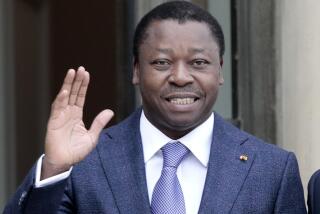Nigeria Leader Again Orders New Elections
- Share via
LAGOS, Nigeria — The nation’s military ruler on Monday ordered new presidential elections to replace the ballot he annulled last month, another twist in this nation’s attempts to move to democracy.
Gen. Ibrahim Babangida issued the decree ordering elections on July 31 after the country’s two political parties failed to agree on his proposals for a transfer of power to a civilian president.
It was the second time he ordered new elections since voiding the June 12 ballot, and it is not likely to be the last word in the leadership crisis that has caused widespread unrest in Africa’s most populous nation.
The announcement is yet another repudiation of wealthy industrialist Moshood K. O. Abiola, who according to unofficial returns won the June election that Babangida subsequently annulled.
Abiola is a member of the Yoruba tribe, and many Nigerians believe that the military, dominated by the Hausa, will not allow him to be sworn in if Babangida adheres to his promise to step down Aug. 27.
An official government communique said new elections are the only available solution to breaking the impasse over the leadership crisis. But the announcement is certain to be denounced by a broad cross-section of Nigerians clamoring for Abiola’s installation as the first civilian president in a decade.
The latest twist in the country’s political crisis came after Babangida said that the two parties have two options: new elections on July 31 or creation of an interim civilian government without Abiola as chief of state.
Babangida also said that all democratic institutions created in the last year as part of the transition to democracy must be scrapped and replaced.
The leadership of Abiola’s party initially agreed to an interim government, but there was a rebellion within the party over the weekend, backing away from that proposal. This led to Babangida’s announcement Monday.
Babangida’s critics have accused him of trying to prolong his hold on power by constantly changing the rules on the transition to democracy.
Babangida’s refusal to recognize the results of the election triggered widespread rioting in Lagos.
Babangida annulled the ballot after accusing Abiola of buying votes and not being fit to rule the nation. He made the move despite creating the only two political parties allowed to take part in the voting, banning dozens of eligible politicians and choosing the two front-runners.
More to Read
Sign up for Essential California
The most important California stories and recommendations in your inbox every morning.
You may occasionally receive promotional content from the Los Angeles Times.










